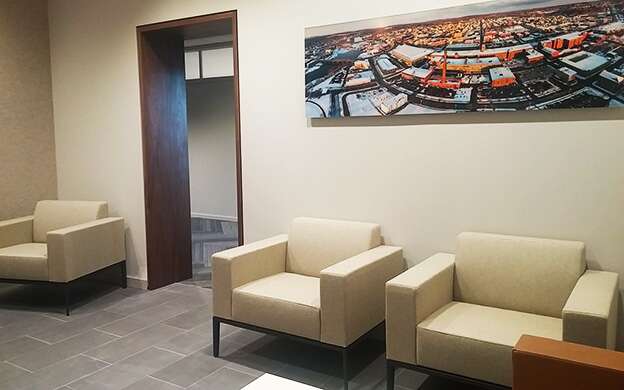
Century-old law firm joins Lewiston's revitalization push
 Courtesy / Erin Anderson
An architect's rendering shows how the renovation of Lewiston law firm Berman & Simmons' headquarters, including preservation of the building's distinctive white brick façade, is expected to look once it's completed this fall.
Courtesy / Erin Anderson
An architect's rendering shows how the renovation of Lewiston law firm Berman & Simmons' headquarters, including preservation of the building's distinctive white brick façade, is expected to look once it's completed this fall.
Berman & Simmons, a law firm that specializes in personal injury and medical malpractice, is renovating the historic building in downtown Lewiston that has served as the firm’s headquarters for over 100 years.
The renovation of the historic Osgood Building at 129 Lisbon St., and the adjacent Supovitz Building, which is also owned by Berman & Simmons, includes preservation of the front of the building and replacement of bricks where necessary, and revamping the first floor for a new reception area and conference rooms. The work began in the spring and is expected to be completed this fall.
The renovation was sparked by the need for modern conference rooms, said the firm’s managing director, Craig Bramley.
“We have been committed to Lewiston and to Lisbon Street for over 100 years, and we really wanted to have a conference space that honors our history, but also reflects who we are as a firm now,” he said.
Face-to-face interactions are key

Berman & Simmons employs 17 lawyers and more than 40 staff members at its main office on Lisbon Street. The statewide firm also has offices in Portland and Bangor, and specializes in representing plaintiffs in serious personal injury and medical malpractice cases.
The new conference space is large enough to seat 50 people, but also has moveable glass walls so that it can be divided into two separate areas.
“What sparked the renovation was the desire to modernize the space, but also to allow it to be more flexible and useful for us as a firm and better accommodate our clients,” he said.
Bramley, who has been practicing law for almost 21 years, said that despite the ubiquity of electronic communications, his firm continues to rely on traditional face-to-face meetings.
“This is our home office, we’re committed to this location and we wanted to make our clients feel comfortable,” he said. “Even though it might seem efficient to do things remotely, the ability to interact with our clients face-to-face is, to me, really important, especially when we represent them in something that is often one of the worst things they’ve been through in their lives, where they’re injured or have lost a loved one and are unsure what’s happening or what’s going to happen. Having a larger, more welcoming space also makes it easier for clients to get in and see their attorneys, because there’s simply more room and we won’t have scheduling conflicts.”
The firm has grown in recent years, adding four lawyers since mid-2014. With specialties in personal injury and medical malpractice, “we’ve had a lot of success recently,” he said.
Evolving specialities
These specialties have evolved in recent years.
Personal injury is “an area that’s become more specialized as time has passed,” he said. “Historically, personal injury was an area where lawyers with a more general practice might do some of that work. Now general practitioners are more likely to refer cases to firms like ours.”
Medical malpractice is even more specialized, he said.
“It requires a lot of time and money to figure out what are valid cases,” he said. “We continue to grow in that area, particularly in the last 10 years. It’s something very few lawyers want to get involved in because they require a lot of money to pursue the cases: You might not have a recovery for a long time.”
The barriers to practicing in the area of medical malpractice, for non-specialists, have become higher, he said.
“When people come to us, unfortunately it’s because something terrible has happened to them or to a loved one,” he said. “They often don’t know if that’s because terrible things just happen or if it’s because someone made an error that shouldn’t have occurred. The process of figuring that out requires experience and the ability to research medical records. It also requires relying on experts—doctors prominent in that field, almost always from outside of Maine—and getting their opinion. The cases are also defended by some of the best defense lawyers in Maine, so the litigation is often expensive and extended over time. Lawyers who practice in much smaller firms or who haven’t developed that expertise over a number of years, or formed contacts in the medical community, are really at a disadvantage.”
Roots in Lewiston
The firm’s commitment to Lewiston is rooted in its staff, Bramley said.
“We have an incredible staff of over 40 people here, many of whom have worked here a decade or more, and many born and raised in the Lewiston/Auburn area,” he said. “As attorneys, we feel one of the great strengths of our firm is our staff. They’re what drives our firm in a lot of ways.”
The commitment also stems from the firm’s history. Benjamin Berman founded the firm in 1914, and was known for representing mill workers.
“The firm was built on the idea of being a resource to mill workers and to the working people of Lewiston/Auburn,” Bramley said. The firm used to be open late hours, “so that when people came off the second shift they could come and see their attorney. Many of us are inspired by the history of the firm.”
In addition, he said, the renovation is in keeping with the revitalization of Lewiston’s downtown.
“There is a lot of positive momentum downtown, with a number of investments being made on lower Lisbon Street,” Bramley said. That includes new business, renovation of the historic McGillicuddy Building, and other larger projects in the works, such as the Hartley Block, which will add retail stores and more than 60 units of mixed-market housing. “Very few businesses on Lisbon Street today, if any, can say they experienced this community’s booming growth period in the early 1900s, stayed through the tough times that followed, and are now part of the downtown’s ongoing renaissance. We’re proud to be one of them.”









Comments